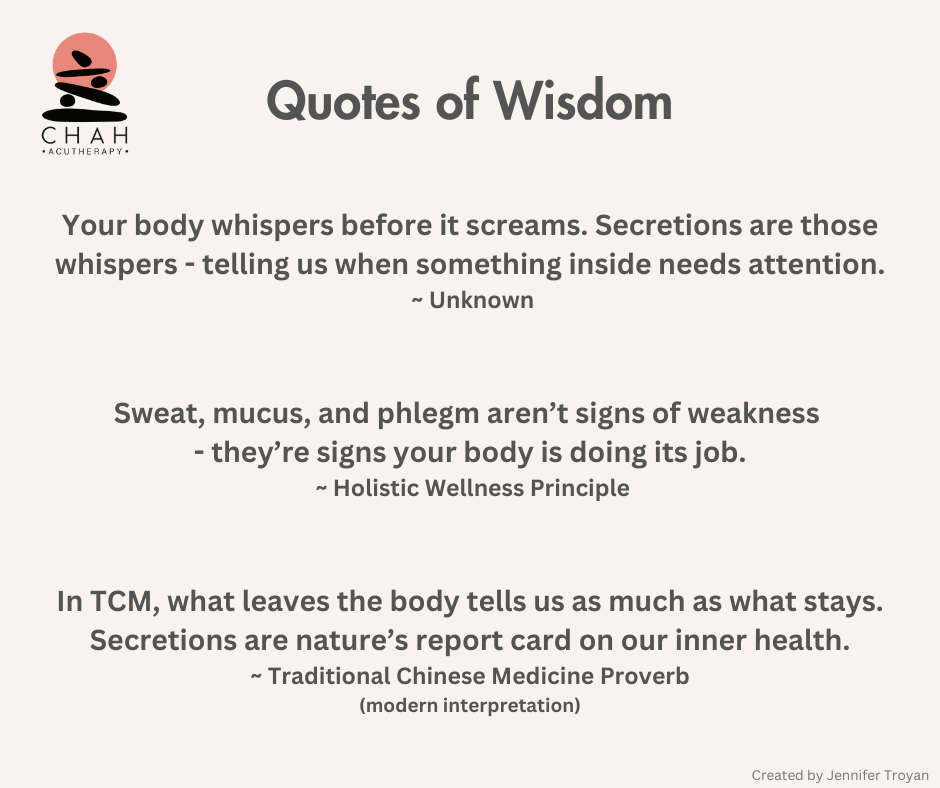
What Your Secretions Say About You
By Maria Chah, DOM, AP & Jennifer Troyan
What a word! Secretions. Most people have an immediate reaction (positive or negative) to thinking about what comes to mind when thinking about this topic. Maybe something gross or maybe sexy. Well, have we got news for you! There are big messages in your secretions, and we want to tell you all about them. We designed this article to be a quick and easy read about the most common ones. Hope you enjoy. Let’s have fun with this while learning.
What are secretions, really?
se·cre·tion
/səˈkrēSH(ə)n/
The word secretion (noun) comes from the Latin secretio, meaning "separation." It's the process by which your body produces and releases substances-like sweat, mucus, or oils - from cells, glands, or organs. These substances serve important functions, such as keeping you cool, cleaning out your lungs, or eliminating waste.
In Traditional Chinese Medicine (TCM), secretions are far more than bodily fluids - they’re messengers. They give us insight into the inner workings of your body, showing signs of heat, cold, dryness, dampness, and even emotional stress.
Why do secretions matter?
Secretions help remove toxins your body doesn't want. If this process is blocked - by things like deodorants, cosmetics, or just a sluggish system - those toxins can build up. Over time, they may settle in your joints, fat tissue, or organs, potentially leading to problems like arthritis, sinus infections, skin issues, or even chronic fatigue.
That’s why TCM sees things like mucus, sweat, and oil (sebum) as essential - not gross. They're your body's natural detox tools. So yes, sweating is actually your body doing a good job!

Understanding What Your Body's Secretions Say About Your Health
In Traditional Chinese Medicine (TCM), the body gives us clues when something is off balance.
Here’s how TCM interprets these everyday things to help understand what’s going on inside:
1. Phlegm and Sputum (From the Lungs)
TCM looks closely at the color and texture of what we cough up:
- Thin and white: This usually means there's a cold condition in the lungs.
- White and sticky: Suggests cold and dampness are stuck in the body.
- Yellow or green and sticky: A sign of "damp-heat" - like when your body has both moisture and heat, possibly from an infection.
- Thick, foul-smelling yellow/green: This may mean there's a serious infection like pneumonia or a lung abscess.
- Dark, coffee-like color: Could indicate internal bleeding and toxic buildup - often more serious.
- Blood streaks: Depending on how much, this could be from dryness, irritation, or something more severe like tuberculosis or a tumor.
2. Nasal Discharge (From the Nose)
What comes out of your nose tells a story, too:
- Clear and watery: Often caused by cold weather or a weak immune system.
- White and sticky: May indicate cold-dampness that's blocking your sinuses.
- Yellow or green: Suggests heat and inflammation, possibly from an infection or sinus issue.
- With blood streaks: Means the condition is more intense - often due to heat causing damage to tiny blood vessels.
- Bright red and heavy bleeding: Could point to something serious like high blood pressure or even a risk of stroke. Medical attention is needed.
3. Sweat (From the Skin)
Even the way we sweat can reveal inner imbalances:
- Oily or pearl-like drops: May indicate a collapse of vital energy (a medical emergency).
- Yellow and smelly: Suggests the body is overheating and full of damp-heat.
- Profuse sweating: May mean your body’s energy (Qi) is weak, or that there’s a heat condition in the digestive system.
- Sweating only on the head (especially in kids): Could be related to food not digesting properly.
- Night sweating: Often a sign of Yin deficiency (your body’s cooling system is weak).
- Sweating during the day: Might mean energy deficiency or too much internal heat.
- Sweaty hands and feet: Could be due to nervousness or imbalances in the heart or kidneys.
TCM teaches us that your body is always talking-through your breath, your skin, and even your sweat. While these signs can provide useful clues, it’s important to consult a qualified healthcare practitioner for a full diagnosis and treatment plan, especially if symptoms are persistent or worsening.

Good health to you all!
--------------------
Information in this article and on this website is intended for informational or educational purposes only. This information does not replace professional medical advice, diagnosis, or treatment. If you have questions about a medical condition, always seek the advice of a doctor or other qualified health professional.
To learn more about our services, please contact our office at 561-249-0447 for a consultation on how to start your annual wellness optimization. During the consultation, we can provide guidance on the best treatment modalities to improve or enhance your state of wellness the TCM way.
Your health team: Chah Acutherapy - We are here for you.
